ICTs-and-Society comes of age
the ICTs-and-Society Network flourishes. 500 colleagues from different fields have signed up since Christian Fuchs and me founded the network in 2008. the conference in Uppsala had about 200 submissions (only 100 could be accepted for presentation), several keynotes and more than 150 attendees, mostly young researchers. the conference was significantly supported by the Swedish Research Council. Christian has done a good job.
Christian Fuchs (photo: CDP21)
the conference was focused in a double respect: first, thematically, on social media; and, second, on the perspective taken – social critique was encouraged.
the discussions proved that social media are ambiguous. they have, as some like to pretend, an “angelic” or a “demonic” side (Andrew Feenberg). they exploit users for the sake of commerce or they foster self-organisation of civil society groups. the conclusion? because of their ambivalence it needs a discourse on how to design them.
Mark Andrejevic and Andrew Feenberg in the closing panel (photo: CDP21)
a glimpse on various topics, research questions and messages i had the chance to listen to:
the use of social media poses a variety of problems to activism, said Thomas Poell who carries out studies on that at the University of Amsterdam. Sebastian Sevignani, a former student of mine in Salzburg, dissected the liberal ideology as foundation of “privacy” and pleaded for a re-definition of the term.
Sebastian Sevignani among his Salzburg phd colleagues Verena Kreilinger (left) and Thomas Allmer (right), all members of the UTI Research Group (photo: CDP21)
Pieter Verdegem, Ghent University, contrasted Facebook with diaspora and asked whether or not the latter manifests communist principles. Alistair Duff’s new book applied Rawls’s idea of justice as fairness to the realm of information, whereas Anthony Hoffmann who does his phd at University of Wisconsin-Milwaukee critiqued Rawls’s basic notions as idealistc abstractions that are not apt to deal with ICTs. László Ropolyi, Eötvös University in Budapest, saw current postmodernity as transitional phase towards a fundamental change of social life through the internet and its successors.
László Ropolyi (photo: CDP21)
Oman Sultan Quaboos University department of mass communication staff member Hosni Mohamed Nasr who made his phd at Cairo University assessed FaceBook as proper instrument for the articulation of long-standing protests of urban youth in Egypt. Lorenzo Coretti from UK analysed the reasons why the Facebook supported anti-Berlusconi movement could not sustain.
Marisol Sandoval, another member of the UTI Research Group, talking with Christian (photo: CDP21)
a considerable number of keynote speakers are known as proponents of critical theory rooted in Marx. though many marxist analysts bemoan the loss of the revolutionary subject – the proletariat – through processes of differentiation, Nick Dyer-Witheford convincingly argued that on the global level, driven by the search for cheap labour, the transnational corporations have been evolving a “Weltgesamtarbeiter”, a planetary general worker who serves as body of Marx’s general intellect.
Nick Dyer-Witheford at the wine reception (left: Christian Christensen, professor in the same department as Christian Fuchs) (photo: CDP21)
for me Marx is back because the digital enclosure (Mark Andrejevic) addresses the question of information as commons (Graham Murdock). it was Slavoj Zizek who, some years ago, inspired me to rethink the enclosure of the commons. Zizek talks about the information commons, about the environment, about the human body as commons which are endangered and about a number of social dislocations that exclude members of society from commons. i would prefer another categorisation. isn’t commons everything that is commonly produced by the members of society? isn’t commons the ultimate reason of society? isn’t it the synergetic effects human agents seek when socialising in a social system? accordingly, i would suggest to speak of commons with regard to the following systems:
– the commons of science and technology (“productive forces”), needed as instrument for intervening in the world, with regard to the technological infrastructure system;
– the commons of human nature and the natural “environment”, both needed for life-support, with regard to the eco-system;
– the commons of economic resources, needed for preserving oneself as member of society, with regard to the economic system;
– the commons of the public sphere, needed to participate in decision-making on the circumstances of social life, with regard to the political system;
– the commons of the pool of values, shared by the community, needed to be accepted as member of the community, with regard to the cultural system;
each system being a system of praxis more general than the one before such that a kind of specification hierarchy is formed. aren’t we sort of excluded from each of these commons? aren’t there struggles going on in any of the systems for recapturing the commons and for fighting the alienation that ensues from the exclusion?
however, the most important point i want to make is the following – and, unfortunately, it was not sufficently stressed at that conference –: isn’t there a connection between the need to design social media, the need to recapture the commons and the need to provide conditions for civilisation to be able to go on? this is my ceterum censeo: the discussion about designing social media is meaningless unless we understand that civilisation requires another regime of accessing and using the commons not just for ensuring progress in humanity but first and foremost in order to guarantee the continuation of civilised life on earth at all! (and it seems that systems thinking should not be underestimated for the task to understand that!)
the plenary session entitled “towards a Global Sustainable Information Society: Information Society Studies and Digital Media Ethics Today”, chaired by Christian Christensen (left), where i presented my talk: Gunilla Bradley, me and Charles Ess (photo: CDP21)


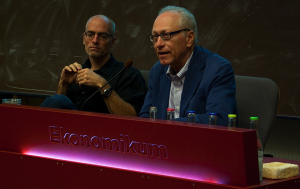
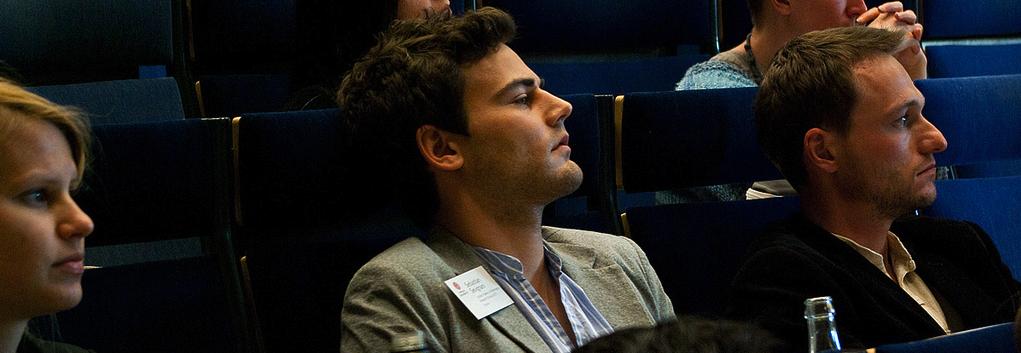
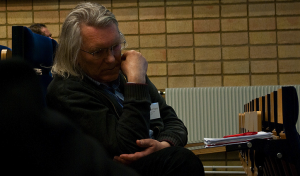
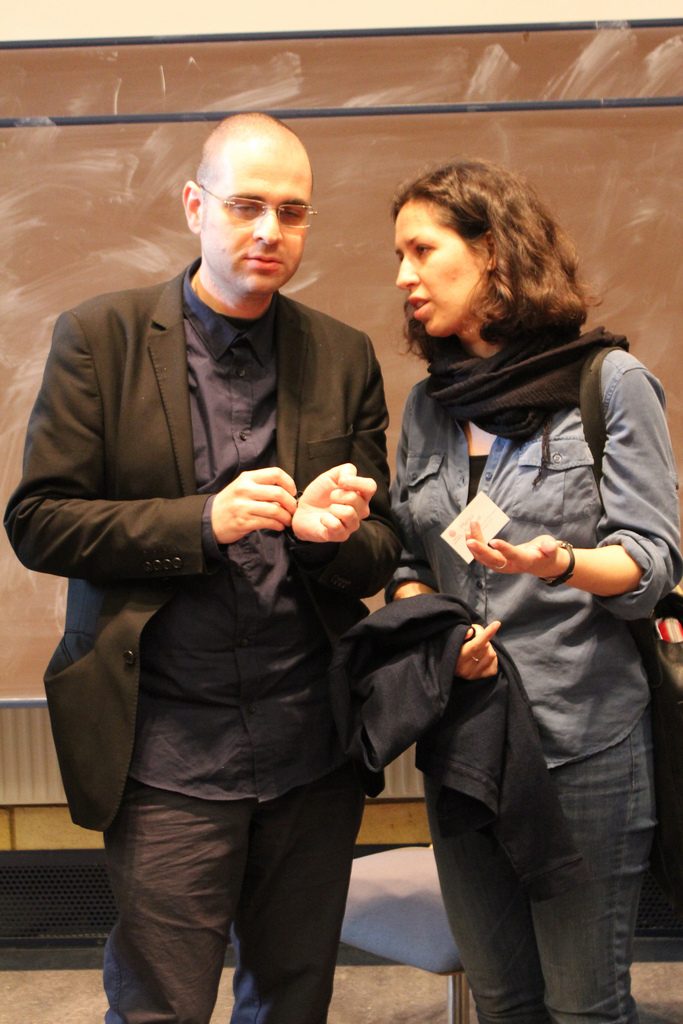
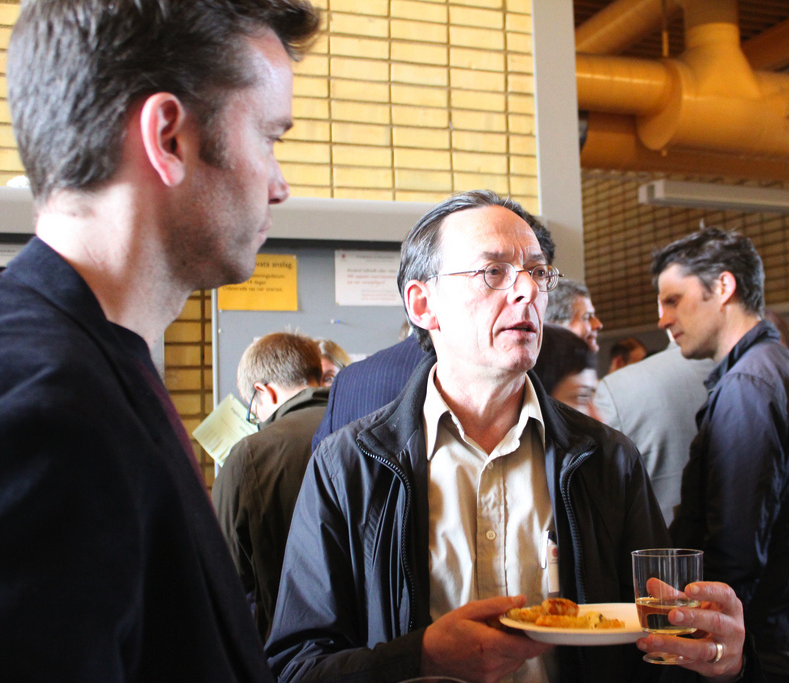
May 14th, 2012 at 9:12 pm
All very interesting – and well done, getting this whole show on the road in the first place. The network is a huge achievement.
Alistair Duff
PS I’m a social democrat, not a Marxist, but we’re all comrades.